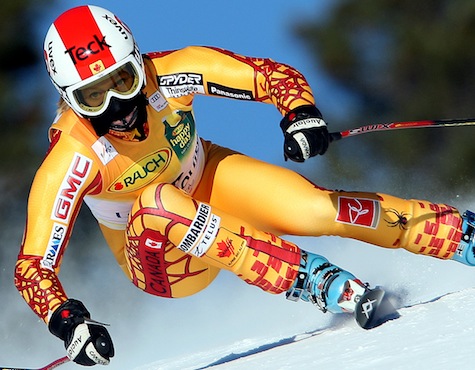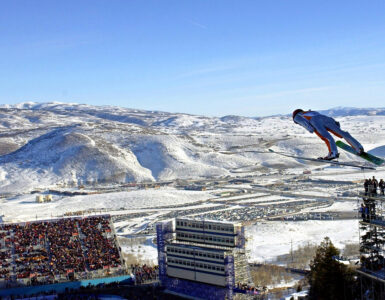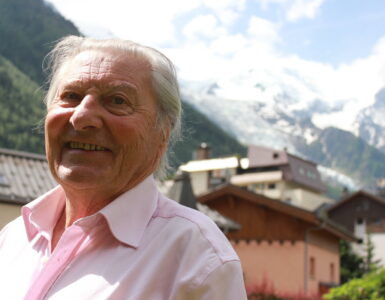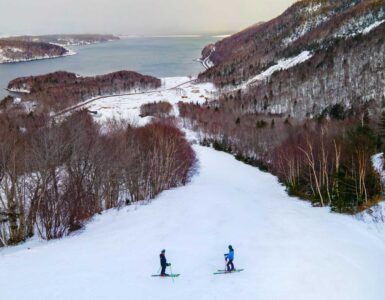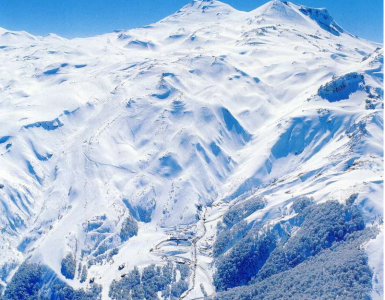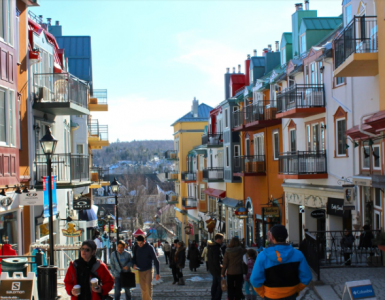Veteran speed skier Kelly VanderBeek – the first Canadian woman to climb onto the podium at the Lake Louise World Cup – is retiring from ski racing following a glittering 12-year career that saw her develop from humble beginnings into a world-class downhill and super-G skier.
The 29-year-old from Kitchener, Ont., is hanging up her skis as the most decorated female member of the Canadian Alpine Ski Team and the last of a generation of ‘Speed Queens’ who helped put Canadian ski racing on the map internationally.
VanderBeek launched her career from the modest surroundings of the tiny Chicopee ski hill near Kitchener but her fierce work ethic and seemingly endless determination helped take her to the very top – claiming three top-three World Cup results and a fourth-place finish in super-G at the 2006 Olympics, where she was famously just 0.03 seconds off the podium. VanderBeek also had a successful junior career, finishing third in super-G at the 2002 and 2003 FIS Junior World Ski Championships.
VanderBeek, who currently resides in Canmore, Alta., with her husband David Ford – a five-time Olympic kayaker – returned to Chicopee Saturday to announce her retirement from ski racing.
“This is where the Olympic dream started for me so it seems only fitting that I’m here to make this announcement,” said VanderBeek, who was born in Kapuskasing, Ont., and moved to Kitchener with her family at the age of seven. “As a ski racer I was prepared for injury but the extent of the knee injury I suffered in 2009 was a bigger than I expected. I’ve always believed I would get back and I’m proud to say I got back.
“Unfortunately, I’ve decided that Sochi 2014 isn’t going to be a possibility because the knee isn’t quite there. But at the same time, I think of the experiences that I’ve had over the past three years and I wouldn’t trade them for the world.
“Sochi was definitely the focus, which is what kept me going as long as I did. I was shooting for the fences and that’s kind of how I try to live life. You aim high and sometimes you don’t make it but it doesn’t devalue the fact that you tried.”
VanderBeek suffered a devastating knee injury during a training run at a World Cup event in Val d’Isère, France, in December 2009. Just months before she was due to compete at her home Olympics in Vancouver-Whistler, B.C., she tore the posterior cruciate ligament and medial collateral ligament in her left knee – in addition to suffering a tibial plateau fracture, an IT band dislodged with bone and extensive cartilage loss under her patella. VanderBeek, who excelled in a new role as a broadcaster during the 2010 Olympic Winter Games, has spent the past three years working towards a comeback. She competed in four World Cup races in January and February, 2012, and spent the summer working hard on and off the hill to give herself the best possible chance of returning not just to regular competition – but to her best form.
“I’ve got to the point where I have a healthy leg and I’m extremely grateful for that,” VanderBeek said. “But I’m not just looking for a knee that can get me down the mountain – I need a knee that can get me down the mountain as fast as the best in the world.
“Time just isn’t on my side. For me, having the chance to be in Sochi just to participate isn’t enough. I want to shoot for the fences; I want to win.”
VanderBeek’s rise to the top began when Swiss ski coach Peter Bassin approached her mom as she skied with her two girls at Chicopee and suggested she enroll them in the ski racing program.
“I loved being out there and the big thing for me was trying to keep up with my sister, who is a year and a half older,” VanderBeek said. “I worked my butt off so I could keep up with her. That’s where it all started.
“Chicopee had a family atmosphere. It was the seed that grew the dream for me. There were 200 kids at the club and I would stand in line for 15 minutes just to do a 10-second run down the hill and then go back and do the same thing again. Had it not been for that little ski club . . .”
VanderBeek recalls watching Canadian Kerrin Lee-Gartner win Olympic gold in downhill at the 1992 Olympic Winter Games in Albertville, France.
“When I was nine years old I watched Kerrin Lee-Gartner win the gold medal and I told my parents I was going to do that. They said, ‘What sport?’ and I said, ‘Skiing,’ ” VanderBeek said. “Luckily, my parents may have chuckled but they never told me I couldn’t do it. In fact, they did everything they could so I could race and chase my dreams.
“I raced with Chicopee until I made the national development team when I was 17 years old. I made the provincial team but I decided to stick with Peter Bassin. He taught me how to work hard and told me that if you want to play with the big girls you have to be tough. His family is like a second family to me. For years, Peter and I hijacked my family’s minivan and drove from race to race. I worked my butt off.”
VanderBeek tasted early success, winning surprise bronze medals at the 2002 and 2003 world junior championships. But it took her longer to make her mark on the World Cup circuit after making her debut at Lake Louise in 2001. She recorded her first top-10 finish in St. Moritz, Switzerland, in 2004 before she made history with her first career podium in the super-G at Lake Louise in 2006. VanderBeek racked up two more podiums, second-place finishes in St. Anton, Austria, in 2007 and Sestriere, Italy, in 2008. She retires having recorded 20 top-10 finishes from 113 World Cup starts and competed in four FIS World Ski Championships.
“World juniors, when I was a surprise podium at 18, was a highlight. And then my first world championships in St Moritz. That was a pretty special place to be because Peter is from there,” VanderBeek said. “The Torino Olympics, finishing fourth and standing in the winners’ circle for over 30 minutes, was really special. I wish I had stayed there but regardless, it was a great experience.
“Getting my first World Cup podium in Lake Louise was pretty neat. My parents were there – what are the odds of your parents being at your first World Cup podium? I knew probably 99 per cent of the volunteers on that course. The ski community really is a family.
“Obviously, the hardest thing was missing Vancouver – having worked so hard to prepare to go out there and have a shot at a medal. I worked for TV and it went really well. They say one door closes, another window opens . . .”
VanderBeek has forged a career for herself as an accomplished broadcaster, having worked as a commentator and reporter for CTV, CBC and Sportsnet. She hopes to continue working in broadcasting, in addition to developing her photography business – Beginnings by Kelly.
“I have sort of a dream and I’m going to swing for the fences,” VanderBeek said. “My husband and I plan to continue enjoying the outdoor activities Canmore has to offer while I continue to pursue further work as a broadcaster and host.”
VanderBeek launched the Kelly VanderBeek Racing Club (KVR) in 2009 – based out of Chicopee – to support young racers in Southwestern Ontario. On Saturday, she skied with KVR athletes and shared stories and words of wisdom.
“It’s been a tough road but I’ve been very lucky to have had the opportunities I’ve had,” VanderBeek said. “The lessons that skiing has taught me are so extensive – they have permeated into every aspect of my life. Skiing has taught me to be stronger, more thoughtful, humble and even cocky at times. But the biggest thing I’ve learned is you are only as good as the team around you. In order to be successful you have to surround yourself with world class people and caring people.”
At a time when there’s a great deal of discussion and debate about the level of corporate support available to Canada’s leading Olympic hopefuls, VanderBeek said she’s lucky to have had a group of very loyal sponsors behind her.
“Teck played a large role in the last five years of my career,” VanderBeek said. “They signed on coming into Vancouver and they really supported me to do what I did. That’s pretty special. I’ve been with (ski company) Volkl since I was 15. And Comcor Environmental, based out of Kitchener, have been with me since I was 18 years old. Most athletes who get injured don’t keep their corporate partners; I didn’t lose one. To me that speaks to the character and quality of people I’ve worked with. I feel extremely grateful on so many levels.”
VanderBeek has fond memories of learning from veterans Mélanie Turgeon and Alison Forsyth, who were Canada’s top female ski racers at the time VanderBeek was trying to establish herself on the World Cup circuit. When she transformed herself from raw rookie into consistent contender, VanderBeek became part of a new generation of Canadian female racers known as the ‘Speed Queens.’
“Emily (Brydon), Britt (Janyk) and I are still quite close,” VanderBeek said. “Sport is very generational and you need people to help keep the legacy going. It’s important to know when you are coming up that you can be on the podium; that you can compete with the best in the world.”
VanderBeek has already passed the torch to a new generation, having spent the past three years training alongside and watching the development of a group of young skiers that includes Erin Mielzynski – the first Canadian to win a slalom World Cup since 1971 – and Marie-Michèle Gagnon, a richly-talented all-round skier who claimed her first World Cup podium last season.
“I’ve worked with them and watched them grow. That’s one of the things that has kept me going as long as I have – I wanted to train with them and watch them excel,” VanderBeek said. “I’m not leaving as the only podium athlete. These girls are so young – the future is very bright.”
At the age of 24, Larisa Yurkiw, of Owen Sound, Ont., is a big part of the next generation of Canada’s female speed skiers. After also suffering a serious injury in 2009, she got a front-row seat as VanderBeek battled back from her own injury.
“Kelly had a very challenging three years and I can only imagine the beating her heart took,” Yurkiw said. “But I know one thing: That big heart was the key to her World Cup success. Three podiums and 20 top-10s – not to mention the grit it takes to train even harder after missing an Olympic podium by three hundredths of a second.
“Kelly’s heart has been chiseled into a gem and she will go on to shine and positively influence people in any avenue she chooses. I wish her luck and offer my sincerest gratitude for teaching her teammates to persevere with poise.”


